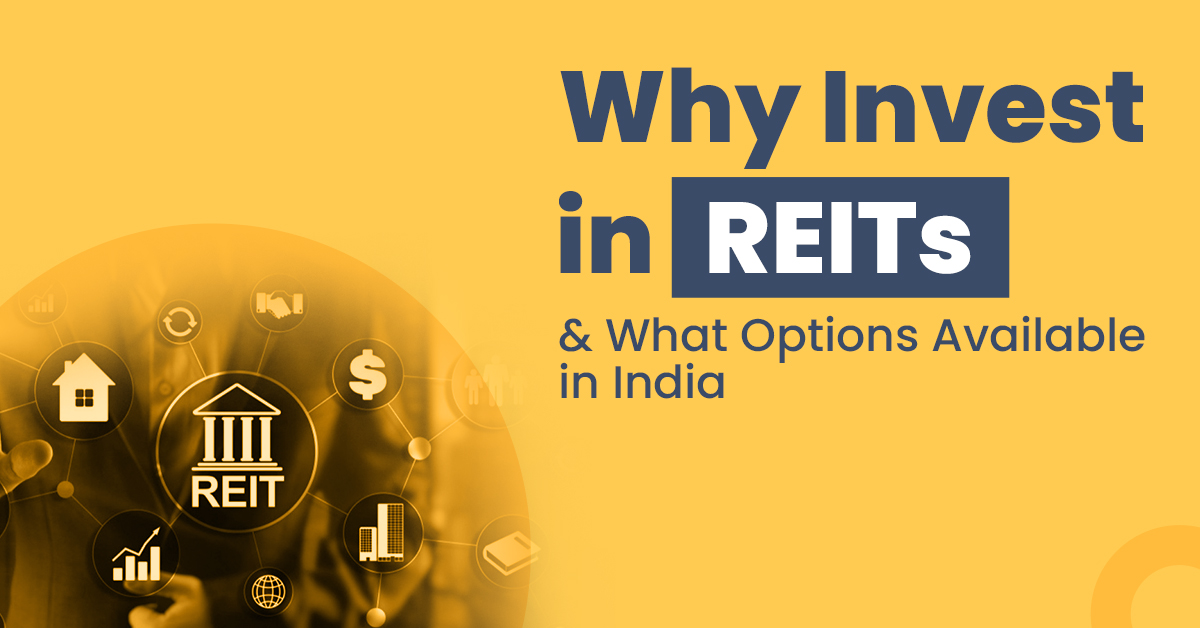Why Invest in REITs and What Are the Options Available in India?


Real Estate Investment Trust (REIT) is a business trust that owns, administers, or finances real estate for generating income by channelising funds. REITs help investors to own high-priced real estate and earn rental income generated by these properties; such rental incomes are returned to the investors in the form of dividends . Since REITs work similar to mutual funds, it enables you to invest in real estate and get decent profits and long-term capital gains.
Furthermore, some REITs are listed on the stock exchanges. So, if you are wondering how to invest in REITs in India, continue reading.
Reasons behind Investing in REITs
REITs provide many benefits to the involved parties like investors, property developers, fund sponsors, and so on. The key reasons for investing in REITs are as follows.
- Distributing income to investors – REITs are legally obligated to distribute at least 90% of their income to their investors as dividends. As a result, it has inspired more investors to invest in REIT funds.
- Tax efficient – Another striking feature of REITs is that they are tax efficient. This is because the government allows REITs the pass-through status. This status signifies that rental income of the REIT is exempt in its hands, but taxable in the hands of the investors.. With appreciated stock, you can sell your shares over a number of years to spread out the capital gains.
- Low risk for investors – The assets of REIT are moderately risky and protected through long-term leases. Thus, it lessens the risk factors for its investors. As 80% of the pooled corpus is invested in revenue generating real estate, risks are further minimised. Only 10% of corpus can be invested in under-construction real estate.
- Diversifying investment portfolio – From the investors’ viewpoint, investing in REIT seems advantageous in two distinct ways. The foremost is that it unveils an opportunity to invest in real estate with added financial security. In addition, they are highly transparent and provide higher liquidity. Secondly, it provides diversification opportunities with new investment options for investors beyond traditional assets like shares, debt and gold.
- Developing liquid assets – Similar to mutual funds, REIT units can be sold easily in the market.Although, as in this model, real estate is marketed in the form of securities, the demand and supply, in this case, will be quite easier. Therefore, REIT investors do not have to worry about paying costs for entry and exit.
- Consistent source of income – Real estate developers benefit from REITs by generating consistent income from their assets. This motivates real estate companies to concentrate more on developing real estate projects instead of owning the properties. As 90% of the income is distributed as dividends, investors also generate decent returns.
- SEBI regulation – REITs are regulated by SEBI since they are involved in trading financial security. The regulation of SEBI is quite strict and rigid for reporting and disclosing all business practices, and REIT will require abiding by them. This ensures complete transparency, which is beneficial for any investor. REITs generally disclose their portfolios semi-annually or annually.
How to Invest in REITs in India?
Following are the best ways to invest in Real Estate Investment Trust in India:
- Investing through Stock Exchanges
Just like Exchange Traded Funds (ETFs), REITs are also traded on stock exchanges. Therefore, gathering REIT units will become easier if an investor has a demat account. However, the cost of REIT units varies according to their demand in stock exchanges and performance. Currently, in India, there are three REIT options available that include Brookfield India Real Estate Trust, Mindspace Business Park REIT, and Embassy Office Parks REIT.
- Investing through Mutual Funds
In India, you can invest in REITs via mutual funds. You can also invest in international real estate. Investors looking to take part in international real estate can look to invest in Kotak International REIT Fund of Fund since it contributes towards investing in International REITs.
- Investing through IPOs
Investors keep an eye out for REIT Initial Public Offerings and invest in them during their launch. Due to continuous changes in the Indian REIT market and the availability of a small amount of REIT options, investors need to conduct detailed research and wait until the launch of the next IPO. Moreover, investors must also consider the risk factors of Real Estate Investment Trusts.
Final Word
Real Estate Investment Trusts are known for their flexibility, dividend benefits, and liquidity. They offer certain benefits like higher liquidity and transparency.However, owing to the volatile nature of the Indian market and REIT options, make sure that you conduct thorough research before making your decision.
Frequently Asked Questions
Can millennials invest in REITs?
Millennials (individuals born during 1981-1997) who are interested in investing in real estate but cannot afford to invest in a huge amount can use REITs. It acts as a benefit for millennials as it provides more liquidity than property investments.
Which is the first REIT?
The first Real Estate Investment Trust is Singapore’s first healthcare REIT that invests in an extensive income-producing real estate in Asia that is applied for healthcare and medicinal purposes.
Who operates REIT?
There are three parties that operate REIT, which are the sponsor, the trustee, and the investment manager.



